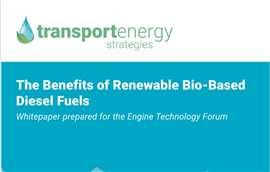ETF publishes white paper on bio-based diesel fuel
18 October 2023
Developed with Transport Energy Strategies, paper addresses emissions benefits of renewable bio-based fuels
 The Energy Technology Forum (ETF) has released a new white paper about bio-diesel fuel. (Photo: ETF)
The Energy Technology Forum (ETF) has released a new white paper about bio-diesel fuel. (Photo: ETF)
The Engine Technology Forum (ETF) is releasing a new white paper, “Benefits of Renewable Bio-Based Diesel Fuels,” which details the production, consumption, future growth and volume potential of alternative fuels such as biodiesel and renewable diesel (RD).
Approved by manufacturers for a variety of diesel-powered engines, machines, equipment and vehicles, RD and RD-biodiesel blends such as B20-R80 and B50-R50 have proven their ability to reduce air pollutants, including nitrogen oxides, particulate matter and greenhouse gas emissions.
“As we look for opportunities to reduce greenhouse gas and other emissions, the use of low-carbon fuels like renewable diesel and biodiesel, offers tremendous benefits for near-term carbon reduction,” said Allen Schaeffer, ETF executive director. “These low-carbon fuels can be used immediately in any one of the millions of diesel engines, tractors, machines and backup electric power generators working in every sector of our global economy.”
Developed by Transport Energy Services, a consultant on global transport energy issues, the white paper states that the RD supply has more than doubled over the past four years – from 800 million gallons in 2019 to 2.6 billion gallons as of March 2023 – and the U.S. production capacity of RD could hit almost 6 billion gallons per year by the end of 2025.
This increase is largely due to demand created by state low-carbon fuel program requirements.
There’s also growing interest in using bio-based diesel fuels in backup generator applications including data centers, hospitals and military customers – all users who intend using RD as a means to preserve existing generator sets while addressing new decarbonization demands.
According to the white paper, utilities, governments and businesses concerned with the continuous supply of electricity primarily continue to lean on diesel generators as the backup power option because they combine power-density, full electrical load handling, rapid response time, reliability and a self-contained fueling supply.
Now, the expanded use of RD in backup diesel power systems and microgrid applications can help these bodies reduce greenhouse gas emissions in line with state and federal decarbonization goals.
“The challenges and uncertainties facing our electric power system today are unprecedented … from needed transmission line upgrades, to increasing frequency of natural disaster and weather-related events, to a greater overall reliance on electricity,” Schaeffer said. “Coupled with the transition to more intermittent renewable fuels like wind and solar, ensuring continuous electrical power to communities and businesses is of greater importance than ever before.”
The white paper specifically discusses how policy considerations for California’s climate and air-quality goals could foster the use of RD and biodiesel-RD blends:
Allowing investor-owned and municipal utilities to include the use of RD and biodiesel-RD blends toward meeting state Renewable Portfolio Standard and allow them to generate Renewable Energy Credits
Expanding the Low Carbon Fuel Standard to allow RD and RD-biodiesel blends to generate credits for non-transportation uses, similar to the RFS2, which allows heating oil as a non-transportation use to generate RINs under the program
Reducing or eliminating the state diesel excise tax as it applies to RD and biodiesel-RD blends
Creating a state tax incentive based on GHG reduction that is structured similar to the Clean Fuel Production tax credit under the recently enacted Inflation Reduction Act
Read the full “Benefits of Renewable Bio-Based Diesel Fuels” white paper on ETF’s site.
The ETF is planning a virtual event to discuss the white paper and related issues. For an invitation, please email [email protected].
STAY CONNECTED




Receive the information you need when you need it through our world-leading magazines, newsletters and daily briefings.
POWER SOURCING GUIDE
The trusted reference and buyer’s guide for 83 years
The original “desktop search engine,” guiding nearly 10,000 users in more than 90 countries it is the primary reference for specifications and details on all the components that go into engine systems.
Visit Now
CONNECT WITH THE TEAM










